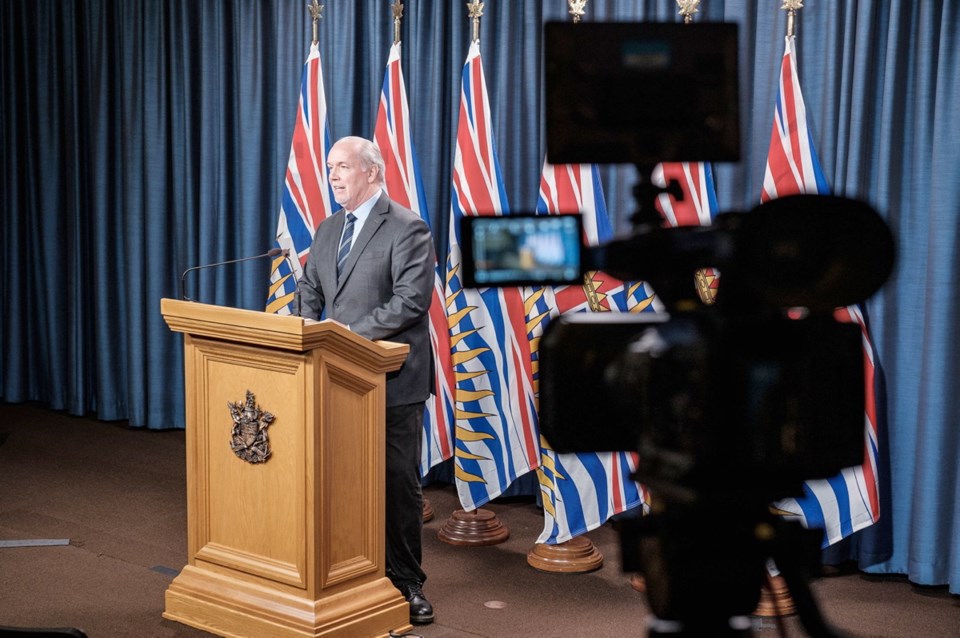Premier John Horgan appeared buoyed Wednesday by what he called “off the charts” public support in B.C. for the drastic measures imposed to curtail the spread of COVID-19.
He’s not going to be able to count on that for the duration.
The first week was a novelty. The second and subsequent weeks were about learning disturbing new routines and rising to a challenge. By the fourth week, the curtailment of most social contacts and wholesale job losses amount to a stressful and profoundly upsetting new world for many people.
The best we can hope for now is gradual relaxation of some, but not all, of the measures.
When?
“The not-too-distant future,” said Horgan. In the meantime, the provincial state of emergency was extended for a second time to April 28. Health Minister Adrian Dix confirmed there will be no change in any of the emergency orders enforcing social distancing until at least then and likely longer.
B.C.’s leadership says the determining factor for letting up won’t be the economic havoc and massive job losses caused by all the curtailment.
It will be the progress in curbing the virus itself.
That issue is being hotly debated around the world, as people try to calculate the obvious and not-so-obvious costs of shutting down big sectors of the economy against the threat to lives.
Provincial health officer Dr. Bonnie Henry is too modest and cautious to say so, but it looks as if B.C. under her leadership has done a very good job at curbing the infection rate. It’s hard to find any national or international measure that doesn’t show B.C.’s approach has been successful so far.
Since she’s unlikely to proclaim that, Horgan did it for her at an appearance Wednesday where he celebrated the numbers and gave everyone a virtual pat on the back.
B.C.’s relative success compared with Ontario and Quebec “is directly attributable to having a provincial plan at the beginning put in place by Dr. Henry and her team,” Horgan said. “We followed that meticulously and we’re seeing the benefits … but we’re not finished yet.”
Citing polling, he said support for the restrictions “is off the charts, it’s just unheard of in our society.
“We’ve seen almost universal support for these initiatives and that’s the strength of our success … We may amend as regions dictate, but at this point, it’s a provincial-wide approach and that’s at the direction of Dr. Henry and the science behind these initiatives.”
Henry is aware of the strain the restrictions impose on people and has been counselling kindness for weeks.
On Wednesday, she said: “We are not at the point we can let up. I know that is very challenging for some people. We’ve heard about people getting frustrated and angry … this is often a manifestation of anxiety and fear.”
Any lessening of the restrictions done on a regional basis would reflect that the majority of COVID-19 cases (83 per cent as of Wednesday) are in Metro Vancouver and the Fraser Valley.
Vancouver Island has only 92 reported cases and northern B.C. just 30 of the 1,561 cases reported in B.C. by way of targeted testing.
To further support the idea that B.C.’s countermeasures against the pandemic are working, the government is planning to release new modelling on Friday.
Horgan said: “You will see that were it not for these measures, the outcomes would have been far different.”
Henry has noted at various times that she has reservations about modelling. But the government needs to maintain people’s confidence that B.C. is making progress.
If that fades, it gets progressively more difficult to maintain the social-distancing that seems to be working so far in confining the cases to mostly long-term-care homes. So, release of encouraging modelling is yet another indication the pandemic’s effects will be around for a protracted period.
Henry said: “It’s really important to recognize that we are not at the end of our beginning yet. And normal is going to look quite different for some time.”
She left the impression that even if you get your job back at some point and are allowed to attend gatherings and go out for dinner, she wants you to wash your hands 10 times a day and keep your distance for months or years to come.



